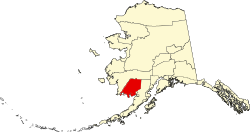Ekuk, Alaska Iquk | |
|---|---|
 | |
 | |
| Coordinates: 58°48′12″N158°33′34″W / 58.80333°N 158.55944°W | |
| Country | United States |
| State | Alaska |
| Government | |
| • State senator | Lyman Hoffman (D) |
| • State rep. | Bryce Edgmon (D) |
| Area | |
• Total | 4.7 sq mi (12 km2) |
| • Land | 4.7 sq mi (12 km2) |
| • Water | 0.0 sq mi (0 km2) |
| Population (2010) | |
• Total | 2 |
| Time zone | UTC-9 (AKST) |
| • Summer (DST) | UTC-8 (AKDT) |
| Website | State of Alaska: Ekuk |
| 72 housing units | |
Ekuk (Central Yupik : Iquk) [1] is a small unincorporated community in the Dillingham Census Area in the U.S. state of Alaska. As of both the 2000 and 2010 U.S. Censuses, it had a population of 2. It is classified by the U.S. Census as an Alaska Native Village Statistical Area (ANVSA). Until 2002 it was the site of a large fish processing operation owned by Wards Cove Packing Company. Currently, it is inhabited mainly by seasonal fishing families who set gillnet in the nearby waters of the Nushagak Bay for mid-summer runs of sockeye salmon, early season runs of king salmon and late season runs of silver salmon.
Contents
Located 15 miles (24 km) southeast of Dillingham, Ekuk is accessible only by sea or by air.
Located in Southwest Alaska on the shores of Bristol Bay (and the Bering Sea), the nearby terrain is covered with tundra with few trees or shrubbery.
